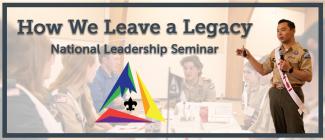
A prominent theme within all of Scouting’s programs is what we leave behind and how we are remembered. Whether it is the legacy you leave as a lodge chief or by starting a brand-new Venturing crew, the opportunities to have an impact are abundant. Within the Order of the Arrow’s premier leadership training, the National Leadership Seminar (NLS), it may seem hard to achieve this goal of leaving a legacy. The notion of leaving a legacy may seem daunting on first glance, and you may not be sure how to get started. The Order of the Arrow’s premier leadership training, the National Leadership Seminar (NLS), can help make your goal of leaving a legacy more achievable.
To illustrate this, I would like to draw upon an experience I had about two years ago. During the summer of 2022, I was asked to serve as a troop guide for my council’s National Youth Leadership Training (NYLT) course. For those who are unfamiliar, a troop guide is the NYLT equivalent of an NLS crew guide. Troop guides are there to guide the patrol through a week of leadership training, not unlike that found at NLS. While at NYLT, my understanding of legacy was completely reshaped. Going into it, I had the mentality that you needed to be running the course to have a real impact, but through spending a week guiding a group of young leaders, I realized that the definition of a legacy varies wildly from case to case. Leaving a legacy is not necessarily running or shaping the structure of a program or community but, rather, leaving a legacy can take the form of developing the skills of future leaders. As a troop guide, I may not have contributed in the sense that I had a lasting impact on the programmatic structure of the course itself, but I did have the opportunity to shape the participants' future. This became apparent when several scouts that I had mentored went on to become troop guides themselves.
To put this back into the context of NLS, you don’t need to be running the course as the region chief or delivering the keynote speech to have an impact and leave a legacy. In fact, you might not even need to be a staff member. While these roles are very important and even critical to the continued success of the program, there are countless other ways to have an impact. I know several people who have experienced a big enough impact from their crew guide that they went on to staff NLS themselves. While the crew guide may not have been running the whole course, they contributed in the most important possible way. By inspiring one of their crew members to take action and actively seek out a place on the staff, they were developing the next generation of leaders within the OA. On an even smaller scale, I was also affected by the participants around me when I attended NLS. Because of the sheer energy of my peers, I enjoyed the course, and I would attend again if given the chance.
So, what does this mean for Scouting as a whole? Well, leaving a legacy can take many forms. Whether you are serving as a national officer or a participant at NLS, you can have an immensely important impact on others. Just because you don’t have a title or even an official role, does not, by any means, mean that you cannot leave a legacy. A legacy comes from the impact that you have on others. In order to leave this mark, the most important thing that you can do is to reach out and help someone else.